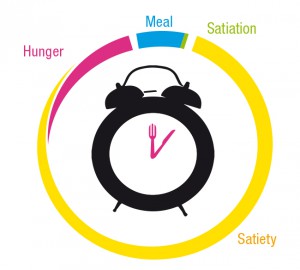Angelo Tremblay explains the potential connections between yogurt and body weight stability



Obesity is a phenomenon that now affects all populations across the globe, both rich and less well-off. It is even spreading at an unprecedented rate among some of our four-legged friends, namely our pets! As part of the scientific sessions organised at EB 2015 by the American Society of Nutrition*, the Yogurt in Nutrition, Initiative for a Balanced Diet brought together 3 international specialists in this field: Dr Jacqui Eales, researcher in systematic reviews (York Health Economics Consortium, YHEC), Dr Richard Atkinson, director of the Virginia Obesity Research Institute, and Professor Angelo Tremblay from the department of kinesiology at Laval University in Quebec. The objective of the event was to take a scientific look at the potential of yogurt in relation to weight management.
Nutritional experts all agree: the fight against obesity, including its prevention, requires a multidisciplinary approach. As pointed out by Dr Richard Atkinson, the progression of obesity seems to be taking the form of an epidemic that spans all age groups and social classes. This is essentially because its origins are linked to several factors which, on the whole, are cumulative, due to the fact that they are connected to our family history (genetics, mother’s diet during pregnancy), our environment, our lifestyle habits (diet and physical exercise, smoking, lack of sleep) and even to infections and antibiotic treatment at a young age.
What role could yogurt play in this complicated patchwork of obesity-related issues? In order to answer this, a careful analysis of all available evidence is vital, using an objective and transparent approach. This work was recently carried out by Dr Jacqui Eales. Hunting down relevant studies is often the first major obstacle: many pertinent studies may not actually be available in published scientific literature. Another challenge is to careful review a large numbers of studies, identifying differences in methodology. In this context, a systematic approach enables the evaluation and summarisation of all evidence available on a particular subject, and is guided by what is known as a “standardized” protocol. This approach also serves as an important tool for establishing guidelines and policies on public health. Dr Eales’ systematic analysis identified, among almost 18,000 scientific studies about yogurt and health, 61 which were about weight management and 22 that met the pre-established quality criteria.
Next, Dr. Richard L. Atkinson, an expert in the causes and management of obesity examined the studies identified in the systematic review of literature conducted by Dr. Eales. He found that the most notable findings came from cross-sectional and cohort studies. Those subjects who regularly ate yogurt tended to have a lower body mass index (BMI) than those who do never consume yogurt. These types of studies enable identification of correlations, i.e. connections between yogurt consumption and weight management, however, they can not establish cause and effect relationships. In view of these first promising results, there is justification for the development of new intervention studies to better understand the mechanisms of action and the plausible cause-and-effect relationships. Dr. Atkinson concluded that yogurt holds great promise, not to cure obesity, but to exert modest, but significant, benefits in losing weight or preventing weight gain and, thus, yogurt consumption has the potential to contribute in improving public health.
A randomised controlled trial performed in the United States by Zemel and colleagues has revealed the most convincing results to date of an association between yogurt intake and weight loss. As part of a low-calorie diet, consumption of yogurt (containing 1100 mg Ca/day) significantly reduced the body weight, body fat and waist circumference of study participants, in comparison with a control group following the same weight loss diet and taking a a calcium supplement (400–500 mg Ca/day). The effect was modest (losing and additional 1-2 kg over the study), but, even a modest reduction in weight could have significant health benefits.
According to Professor Angelo Tremblay, there are potential four mechanisms identified in the literature for explaining weight stability over time in people who regularly consume yogurt. Firstly, consumption of yogurt is associated with other healthy behaviors. People who regularly eat yogurt take part in more physical activity. In addition, they undergo a process known as substitution: yogurt and dairy products replace foods that are less healthy, leading to an indirect beneficial effect on body weight. A recent study from Ortinau and co-workers suggests that a less energy-dense, high-protein afternoon snack like yogurt, compared to chocolate or crackers, could be an effective dietary strategy to improve appetite control and regulate energy intake in healthy women. But yogurt also has direct effects, mainly through the nutrients that it contains: calcium and dairy protein, both of which affect the regulation of appetite and energy metabolism. These actions are controlled by hormones found in the intestines. The texture of yogurt, its structure and, in particular, its protein matrix also affect energy metabolism, independently of calcium or other nutrients that it may contain, such as added fiber or sugar.
Lastly, the living bacteria in yogurt are another factor that may explain the beneficial effects of yogurt consumption on how the body metabolizes nutrients. In this respect, recent data suggests that some probiotic supplements facilitate appetite control and increase weight loss when used as part of a weight-loss program. As for the often criticised addition of sugar to yogurt, Professor Tremblay downplayed its negative effects on the nutrient profile of yogurt; studies show that it added sugar increases yogurt’s palatability, but has no effect on blood sugar levels nor overall energy intake.
By way of conclusion, Dr Sharon Donovan (USA), co-chair of the Yogurt in the Nutrition Initiative for a Balanced Diet (YINI) Advisory Board , summarised the key messages and pointed to a number of avenues for research on the relationship between yogurt and weight control that will be necessary in the future:
* Boston, 28 March 2015, Boston Convention Exhibition Center

Proposals are requested for projects focused on the role of yogurt in the prevention and management non-communicable diseases. Research focused in the following areas are particularly encouraged: mechanisms of action, pediatric populations and diet quality and health parameters.
For 2015, $30,000 (thirty thousand dollars) are available to support one application. Proposed projects will be funded for up to 2 years. The competition is open to research teams from public research organizations or researchers at universities or hospitals. Applications can be from individuals, a single team or several teams in collaboration. Proposals must be neither previously published nor subject to patent disclosures.
The rules can be downloaded thereafter or obtained by email: ana.pires@danoneinstitute.com
Applicant teams must appoint a project Scientific Leader who will be responsible for completing the application, which shall contain the following sections. All proposals must be submitted in English.
The scientific leader must send the application and all of the above documents, in PDF format, to: ana.pires@danoneinstitute.com or in the contact section of the YINI website. Applications from YINI Members and YINI Grant Jury members will not be considered. The deadline for submission of applications is 1st September 2015.

Numerous factors may explain a beneficial effect of yogurt on body weight stability and metabolic fitness. Cohort studies show that the consumption of dairy including yogurt is related to a reduced intake of high fat-high sugar foods, suggesting that the benefits of dairy food may be due to a decrease in the potential negative effects of unhealthy eating. Yogurt consumption may thus be the signature of a global healthy lifestyle and food-related personal profile.
The ability of yogurt to promote a negative energy balance is also likely explained by the satiating and thermogenic effects of some of its nutrients, e.g. calcium and proteins, via mechanisms involving gut hormones. The presence of bacteria in yogurt represents another factor that may explain the effects of yogurt consumption on energy balance and its components.

Azmina was thrilled to attend the 3rd Yogurt Summit, dedicated this year to yogurt and weight management. She thinks it was a great opportunity to meet other experts and learn about the latest research on yogurt. She was also impressed by the use of yogurt in a lot of different savoury dishes: “Do not think of yogurt only as a dessert! It’s so versatile!”. She was finally interested in the link between protein and satiety, and evidence suggesting that yogurt may help reduce appetite and limit energy intake.

A recent systematic review of the consumption of yogurt for weight management provides a good example and demonstrates how systematic review methods can bring objectivity and transparency to a review, and shows how challenges, such as heterogeneity between studies and confounding factors, can be identified. It also demonstrates the usefulness of recommendations for the design and reporting of futures studies in the topic area.

When it comes to limiting weight gain and reducing the risk of obesity the beneficial potential of yogurt has to be considered, said Professor Andre Marette, who was an attentive attendee at the 3rd Yogurt Summit, in Boston, March 28.
According to him, “we learn more about yogurt components and how it can help to manage body weigt gain . Yogurt is part of a healthy dietary pattern and seems to be a suitable way to help prevent weight gain, by consuming more proteins along with beneficial nutrients such as vitamins and calcium and at the same time reducing the energy content that other snacks provide. There is also growing evidence that yogurt consumption on a regular basis is associated with lesser weight gain and may have a major impact on diseases like Type 2 Diabetes. The effect of yogurt on weight management can be scaled up to the whole population : even a modest reduction in weight would have significant economic benefits. We still need more mechanistic studies, but it is very promising.”

Satiety is the feeling of satisfaction we get after we have eaten a meal and has an important influence on how much we eat overall. If satiety lasts for a while, it can reduce how much food we eat at the next meal or snack. Alongside satiety is ‘satiation’ – the process leading an individual to stop eating (1).
 Figure 1: Appetite control
Figure 1: Appetite controlAs food is eaten, digested, absorbed and then metabolised, it triggers an orchestra of satiety influencing hormones, peptides and nerve messages from the gut, the brain and the body’s fat cells (1). As well as these physiological responses, satiety & satiation are influenced by many factors including our food beliefs, emotions, the taste and smell of food, and our immediate environment (1) – we can always manage that tempting dessert from a buffet table, or comforting crisps or chocolate, no matter how full we feel! Foods that give satiation signals a helping hand could benefit people to manage their health and weight in our food-filled environment. As evidence supports energy (calories) from protein being more satiating than energy from carbohydrate or fat (1, 2), the effect of protein-rich foods on appetite control is a hot topic.
A protein-rich meal or meal preload increases satiety & satiation
When researchers want to test the effect of protein on fullness, they often use a preload design, where the test food is eaten before a meal. A literature review reported that in the majority of studies, a protein preload significantly enhanced satiety ratings – in other words, appetite was reduced (3). Studies suggest that protein leads to a reduction in appetite[/mks_pullquote] Taking this a step further, researchers have found that compared to a typical protein breakfast (10% energy from protein), a higher protein breakfast (25% energy from protein) led to a more pronounced reduction in appetite (but no reduction in energy intake at the next meal). A more pronounced increase in appetite-regulating hormones was observed after the high protein meal (4, 5, 6).
Dairy and yogurt protein favour satiety and help you eat fewer calories at the next meal
While the overall body of research to date indicates no clear view that one type of protein can help us feel fuller for longer than another (7), there remains a strong interest in the potential benefit of whey protein. Whey and casein protein are the key dairy proteins, and whey protein is more rapidly digested and absorbed (8).
Lorenzen et al (9) found that milk was more satiating than whey or casein alone. This may be because of the unique combination of a ‘slow’ and a ‘fast’ protein found in milk. No significant difference on postprandial energy expenditure was observed. However, a small but significant increased lipid oxidation was observed after casein compared with whey.
Akhavan et al. (10) tested different combinations of water and whey protein in a meal preload to test its impact on people’s energy (calorie) intake at lunchtime. Interestingly, the protein containing preload resulted in a “negative calorie effect” – the size of the calorie reduction at the lunch was greater than the calories in the protein preload.
Keeping to a healthy weight isn’t easy, especially when constantly surrounded by tempting foods. There is no quick-fix. Lifestyle habits that allow us to enjoy a varied diet, regular eating patterns and physical activity are the key to long-term weight management. Recent studies (11) suggest that “sleeping well” is also a key issue in the prevention of excess body weight.
Anything that offers a helping hand is good news. Diets with a low energy density have been shown to help improve satiety (12). Energy density is defined as the number of calories/weight (in grams). Low energy dense foods provide between 0.6 to 1.5 kcal/g. Low energy dense foods tend to have a high water content – soups, stews, fruits, and vegetables, for example. Many lower fat and higher fibre foods also have fewer calories per gram. The British Nutrition Foundation Feed Yourself Fuller Chart (13) clearly depicts low fat yogurt as having an energy density of 0.78 (0.78 kcal/g), which is classed as “low”.
There is building evidence that a higher protein snack may be beneficial, thanks to its potential effects on satiety, and energy intakes in the next meal. A formulation of yogurt enriched with whey protein might further improve the acute satiating effect of yogurt (Tremblay, et al, unpublished data). High protein snacks have been shown to influence subsequent eating[/mks_pullquote] A study by Douglas and colleagues (14) assessed whether an afternoon snack could influence appetite sensations as well as eating initiation at dinner. The investigators randomly provided women with a yogurt snack that varied in protein content (5, 14, or 24 grams) or with no snack. Regardless of protein content, snacking resulted in reduced hunger and increased fullness. Further, hunger was lower and fullness was higher following the consumption of the high-protein yogurt as compared to the low-protein version. Interestingly, consumption of the high-protein snack delayed the onset of eating at dinner as compared to no snacking. While there was no difference in the energy content consumed between the yogurt snacks and no snack throughout the test day, the delayed onset of eating suggests that satiety was higher and the motivation to eat was less following the high-protein snack.
So how might protein, including dairy protein, influence hunger and satiety? One way appears to be via its effect on different appetite-regulating hormones released by the intestine and the brain. For example, a high protein meal has been shown to increase the levels of PYY and GLP1 (15), which seem to work to reduce appetite by slowing stomach emptying and via direct communication with the brain’s appetite-regulation centre in the hypothalamus and brain stem (2,16). A recent study highlighted a potential effect of dairy protein where compared to a low dairy/calcium weight loss diet, a high dairy/calcium diet resulted in higher blood levels of PYY and greater feelings of satisfaction after a meal. However this did not translate into a difference in weight loss (17).Written by Angelo Tremblay, Chris Cifelli and Azmina Govindji
Yogurt reduced hunger ratings compared with servings of milk and cheese with the same calorie content and volume (18).
Young adults given an isocaloric afternoon snack of either a liquid yogurt or chocolate bar had higher satiety ratings (lower hunger, desire to eat, appetite and more feelings of fullness) for the hour before their evening meal after the liquid yogurt, which naturally contained 7.5g more protein (19).
Low fat yogurts, whether drinkable or eaten with a spoon, had a greater satiating effect (lower hunger and higher fullness ratings) than isocaloric fruit-based drinks or dairy fruit drinks (20).
When high protein less energy-dense snacks like yogurt are compared to high fat snacks having the same calorie content, consumption of the yogurt led to greater reduction in afternnoon hunger (p < 0.01). This study suggests that eating less energy dense, high-protein snacks like yogurt in place of isocaloric high fat snacks, can improve the control of appetite and energy intake in healthy women (21).


Serves : 10 of 100 g
Take a look at our healthy recipes section to find delicious and nutritious dishes for all occasions.

